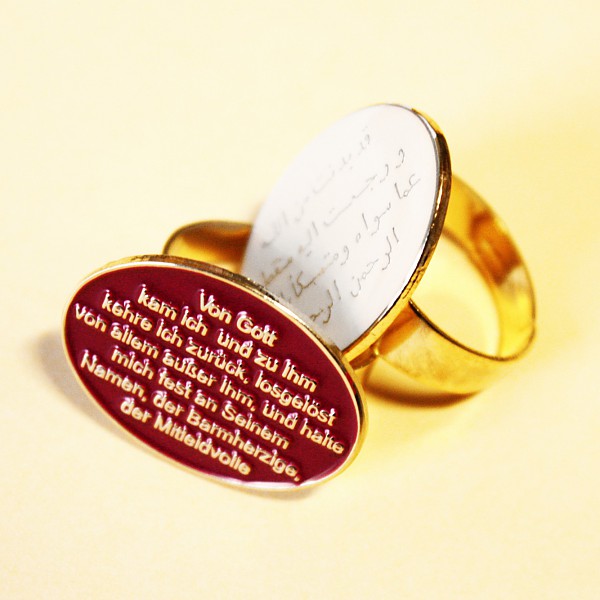Bahá'í Burial rings
Bahá'í Burial
Two rings, german and Arabic
from the Bahá'í Gemeinde Kassel
The Bahá'í Faith is now one of the world's most widespread religions, with some 8 million believers. The teachings of Bahá'u'lláh (1817–1892), which gave its name to the monotheistic religion that emerged in what was then Persia in the 1840s, are the foundation of the religion. At its heart is the concept of progressive revelation: Bahá'ís believe that the religions of the world all share the same divine source, an unchanging core, and differ only in their time-dependent social and cultural laws. At the heart of their faith is the unity of humanity, a unity in diversity: "The earth is but one country and all men are its citizens. (Bahá'u'llah)
Based on Bahá'u'lláh's provisions in the Kitáb-i-Aqda, the current funeral guidelines are summarized in the 2017 publication "The Bahá'í Funeral Laws and Related Topics". These funeral laws apply to members of the Bahá'í community who are over the age of 15. After washing, the deceased is wrapped in five silk or cotton shawls and the engraved burial ring is placed on the finger. The prayer for the dead is said before the funeral. The observance of the symmetry of slow birth to slow decay of the body on the one hand, and the special significance of the body as a "temple of the soul" on the other, prohibits Bahá'ís from cremation. Thus, the coffin should be made of durable material, such as hard wood, stone, or crystal, and the deceased should be buried as soon as possible and no more than one hour's walk from the place of death. Even with today's fast means of transport, the desired location is often not reachable within an hour. Dying on journeys sometimes means great effort for the relatives, who have to accept the grave as a place of farewell and mourning in the distance. The grave should be oriented according to the direction of the shrine of Bahá'u'lláh (the direction of prayer, Qiblih) in Bahjí/ Akkon, Israel. The tomb should be separated from the rest of the earth and – as in other religions such as Judaism or Islam – should be given eternal rest. To comply with all these regulations and needs leads to compromises and above all to questions which the young community in Germany and in other countries still has to clarify, also with regard to their own graves. In addition to the relatives, the elected Bahá'í institutions – the nearest Local Spiritual Council or National Spiritual Council of Bahá'ís in the respective country – are responsible for ensuring that these regulations are observed and the funeral is conducted, and, if necessary, provide assistance in covering transportation and funeral expenses.

© Museum für Sepulkralkultur, Kassel, Bildarchiv
The ring that is given to all Bahá'ís of full age to take to the tomb can be customized, but it always bears the verse of Baha'u'llah,
"I came forth from God and return unto Him, detached from all save Him, holding fast to His name, the Merciful, the Compassionate".
Arbeitsgemeinschaft Friedhof und Denkmal e.V.
Zentralinstitut für Sepulkralkultur
Museum für Sepulkralkultur
Weinbergstraße 25–27
D-34117 Kassel | Germany
Tel. +49 (0)561 918 93-0
info@sepulkralmuseum.de








